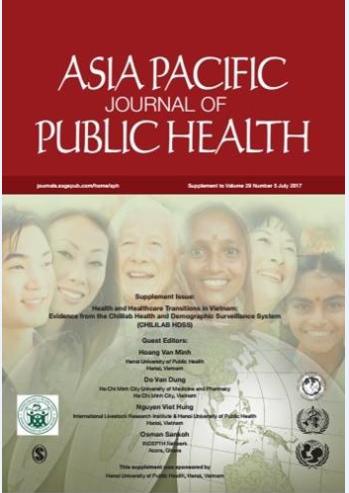Trang chủ - Chililab publication - Capacity of Commune Health Stations in Chi Linh District, Hai Duong Province, for Prevention and Control of Noncommunicable Diseases
Capacity of Commune Health Stations in Chi Linh District, Hai Duong Province, for Prevention and Control of Noncommunicable Diseases

Nguyen Thi Thuy Nga, MHM, PhD (cand), Bui Thi My Anh, MPH, Nguyen Nguyen Ngoc, MPH, Dang Minh Diem, MD, Vu Duy Kien, PhD, Tran Bich Phuong, BSc, Tran Quynh Anh, MPH, Hoang Van Minh, MD, PhD
Abstract
The primary health care system in Vietnam has been playing an important role in prevention and control of diseases. This study aimed to describe the capacity of commune health stations in Chi Linh district, Hai Duong province for prevention and control of noncommunicable diseases (NCDs). A mixed-methods (quantitative and qualitative approaches) approach was applied to collect data in 20 commune health stations. The participants, including health workers, stakeholders, and patients with NCDs, were selected for the study. The findings reported that the main activities of prevention and control of NCDs at commune health stations (CHSs) still focused on information-education-community (IECs), unqualified for providing screening, diagnosis, and treatments of NCDs. The capacity for prevention and control of NCDs in CHSs was inadequate to provide health care services related to prevention and control of NCDs and unmet with the community’s demands. In order to ensure the role and implementation of primary care level, there is an urgent need to improve the capacity of CHSs for prevention and control of NCDs, particularly a national budget for NCDs prevention and control, the essential equipment and medicines recommended by the World Health Organization should be provided and available at the CHSs.
Full-text link:
- http://journals.sagepub.com/doi/full/10.1177/1010539517717020
- https://www.ncbi.nlm.nih.gov/pubmed/28719767
Source: Center for Population Health Sciences (CPHS) – Hanoi University of Public Health
Chủ đề :
primary health care system; commune health station; NCDs; CHSs; prevention and control of NCDs; primary care; capacityTIN CÙNG CHUYÊN MỤC
- A Secular Trend in Birth Weight and Delivery Practices in Periurban Vietnam During 2005-2012
- Blood Glucose Disorders and Access to Health Care Services Among Adults Aged 30 to 69 Years in Chi Linh, Hai Duong, Vietnam
- Determinants of Health-Related Quality of Life Among Elderly: Evidence From Chi Linh Town, Vietnam
- Prevalence of Smoking and Associated Factors: Evidence From the CHILILAB Demographic Surveillance System in Vietnam
- Sex Ratio at Birth in Vietnam: Results From Data in CHILILAB HDSS, 2004 to 2013
- Prevalence of Self-Treatment Practice and Related Factors Among Workers Aged 15 to 60 Years in Chi Linh Town, Hai Duong Province, Vietnam

